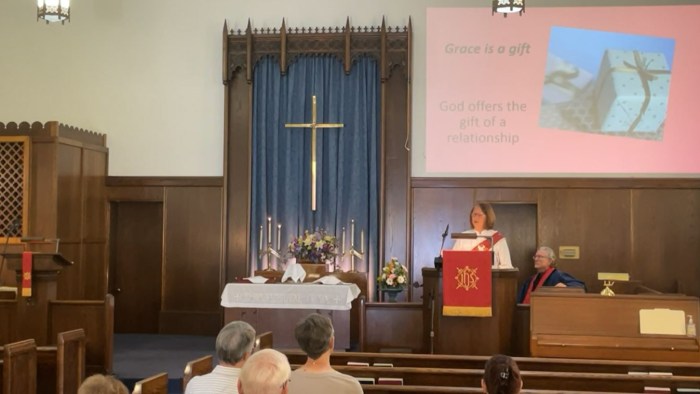Gracia Preveniente Iglesia del Nazareno, a vibrant faith community, has left an indelible mark on Christianity through its distinctive beliefs and practices. From its historical roots to its contemporary challenges, this denomination offers a captivating narrative that intertwines theology, social engagement, and evangelism.
With a rich history spanning over a century, Iglesia del Nazareno has played a significant role in shaping the Wesleyan tradition. Its core doctrines, emphasizing the prevenient grace of God and the importance of holiness, have guided its members in their pursuit of a Christ-like life.
Historical Context of Gracia Preveniente Iglesia del Nazareno

The Gracia Preveniente Iglesia del Nazareno (GPIN) traces its roots to the Methodist Episcopal Church, South, which was founded in the United States in 1845. In 1917, a group of Spanish-speaking Methodists in Los Angeles, California, led by Rev. E.P.
Garcia, established the first GPIN congregation.
Founding Principles
- Emphasis on the Wesleyan doctrine of prevenient grace, which holds that God’s grace precedes human effort in salvation.
- Commitment to evangelism and spreading the gospel to all people.
- Holistic approach to ministry, encompassing both spiritual and social needs.
Key Events in Church History
- 1917: Establishment of the first GPIN congregation in Los Angeles.
- 1931: The GPIN becomes a district within the Church of the Nazarene.
- 1968: The GPIN becomes a full-fledged denomination.
- 1988: The GPIN establishes its headquarters in San Antonio, Texas.
Name and Wesleyan Theology
The name “Gracia Preveniente” reflects the church’s emphasis on the doctrine of prevenient grace. According to Wesleyan theology, prevenient grace is the unmerited favor of God that enables individuals to respond to the gospel message and experience salvation.
Theological Beliefs and Practices
Core Doctrines
- The Trinity: The Godhead consists of the Father, Son, and Holy Spirit.
- Salvation by grace: Salvation is a free gift from God, received through faith in Jesus Christ.
- Holiness: Christians are called to live a life of holiness, empowered by the Holy Spirit.
Role of Grace
Grace is central to GPIN theology. It is seen as the driving force behind salvation, sanctification, and Christian living. Prevenient grace initiates the process of salvation, enabling individuals to repent and believe in Christ. Sanctifying grace empowers believers to live holy lives.
Sacraments
- Baptism: GPIN practices believer’s baptism by immersion.
- Communion: GPIN celebrates communion regularly as a remembrance of Christ’s sacrifice.
Organizational Structure and Governance

Hierarchical Structure
GPIN has a hierarchical structure with a General Superintendent as the top leader. The church is divided into regions, districts, and local churches.
Leadership
- General Superintendent: Elected by the General Assembly and serves as the chief executive officer of the church.
- District Superintendents: Oversee the districts and provide leadership to local churches.
- Pastors: Lead individual local churches.
Governance
GPIN is governed by a General Assembly, which meets every four years. The General Assembly elects the General Superintendent and other denominational leaders and sets policies for the church.
Social and Community Outreach
Programs, Gracia preveniente iglesia del nazareno
- Community health clinics: Provide medical care to underserved communities.
- Food pantries: Distribute food to those in need.
- After-school programs: Offer educational and recreational activities for children.
Engagement
GPIN encourages its members to engage with the local community and address social issues. The church supports organizations working to promote social justice and equality.
Missions and Evangelism: Gracia Preveniente Iglesia Del Nazareno

Mission
GPIN’s mission is to spread the gospel of Jesus Christ to all nations and to make disciples of all people.
Evangelism
- Outreach programs: Conduct evangelistic events and distribute literature.
- Missionary work: Send missionaries to serve in countries around the world.
- Church planting: Establish new churches in unreached areas.
Global Impact
GPIN has a global presence with churches in over 100 countries. The church’s missionaries provide humanitarian aid, medical care, and education in developing countries.
Contemporary Issues and Challenges
Changing Societal Norms
GPIN faces challenges adapting to changing societal norms, such as the rise of secularism and the decline of traditional family structures.
Reaching Younger Generations
The church seeks to engage younger generations and make its message relevant in the digital age.
Maintaining Relevance
GPIN strives to remain relevant and impactful in the modern world by adapting its methods and programs to meet the needs of contemporary society.
Essential FAQs
What is the significance of the name “Gracia Preveniente”?
The name “Gracia Preveniente” reflects the church’s emphasis on the prevenient grace of God, which precedes human effort and enables individuals to respond to the call of salvation.
How does Iglesia del Nazareno view the role of sacraments?
The church recognizes two sacraments: baptism and communion. Baptism is seen as a symbol of cleansing and initiation into the Christian faith, while communion is a remembrance of Christ’s sacrifice and a means of spiritual nourishment.
What are some of the contemporary challenges facing Iglesia del Nazareno?
The church faces challenges such as declining membership, the rise of secularism, and the need to address social issues such as poverty and inequality.